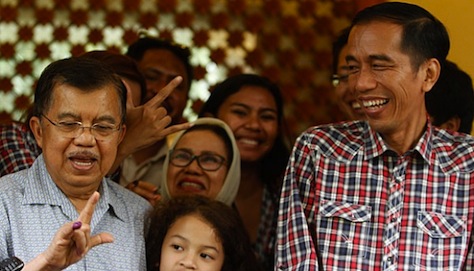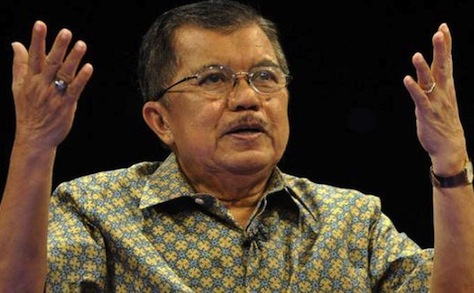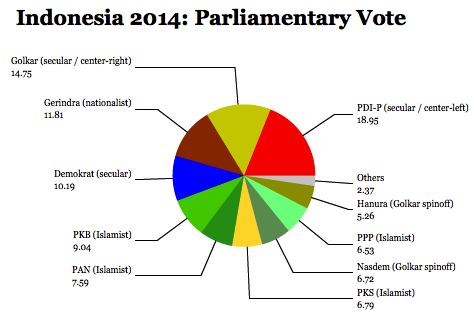It’s official — with Monday’s announcement that Indonesian presidential frontrunner Joko Widodo (‘Jokowi’) has chosen former vice president and former Golkar party chair Jusuf Kalla as his running mate, the chief presidential tickets and their alliances for the July 9 election are now largely settled.![]()
The Jokowi-Kalla ticket pairs the young Jakarta governor, age 52, with a longtime steady hand who, at age 71, is nearly two decades older than Jokowi, the standard-bearer of the Indonesian Democratic Party of Struggle (PDI-P, Partai Demokrasi Indonesia Perjuangan), which emerged as the strongest in Indonesia’s parliamentary elections in April shortly after naming Jokowi as its presidential candidate. Its leader, Megawati Sukarnoputri, daughter of Indonesia’s first post-independence president, and a former president between 2001 and 2004, remains a powerful figure behind the scenes.
Kalla (pictured above, left, with Jokowi) previously served as vice president between 2004 and 2009 under outgoing president Susilo Bambang Yudhoyono (known in Indonesia as ‘SBY’). The two often clashed, and Kalla often appeared the more substantial figure, given his party’s much larger bloc of seats at the time in the Dewan Perwakilan Rakyat (DPR, People’s Representative Council), the lower house of the Indonesian parliament. Though Kalla will undoubtedly boost Jokowi’s chances of winning in July, there’s a risk that he could come to be seen as the puppet-master of a future Jokowi-led administration.

Despite last-minute speculation that Kalla’s party, Golkar (Partai Golongan Karya, Party of the Functional Groups), would support Jokowi, Kalla seems to have split from his party to join Jokowi’s ticket. Golkar will instead back the presidential candidacy of Prabowo Subianto, the leader of Gerindra (Partai Gerakan Indonesia Raya, the Great Indonesia Movement Party), itself a spinoff from Golkar in 2008.
* * * * *
RELATED: ‘Jokowi’ effect falls slat for PDI-P in Indonesia election results
RELATED: Veepstakes, Indonesia-style: Will Kalla return as vice president?
* * * * *
What’s remarkable is that Golkar’s leader, former presidential candidate Aburizal Bakrie, ultimately supported Prabowo without winning the vice presidential slot for himself.
Instead, Prabowo last week chose Hatta Rajasa, the chair of the Partai Amanat Nasional (PAN, National Mandate Party), a moderate Islamist party. Hatta (pictured above, right, with Prabowo) has served since 2009 as coordinating minister for economics in the current administration; he previously served from 2007 to 2009 as state secretary and from 2004 to 2007 as transportation minister. He’s been the chairman of the PAN since 2010 — and he has deeper ties to Yudhoyono, given that his daughter is married to Edhie Baskoro, the president’s youngest son.
What does Kalla bring to the ticket? Aside from experience, he’ll bring the gravitas of someone who can balance Megawati’s influence in a Jokowi administration. He’ll bring a great deal of support to the ticket from his native Sulawesi and from his wider base in eastern Indonesia. Even if Prabowo has Golkar’s formal support as a party, many of its voters will follow Kalla’s lead and vote for Jokowi.
Kalla, too, is Muslim, and he’s a member of Nahdlatul Ulama (NU), a longtime Sunni Islamic civil society group, so the Jokowi-Kalla ticket will win at least some Muslim votes. Though three Islamist parties have backed Prabowo, the one that won the most votes in the April legislative elections, the Partai Kebangkitan Bangsa (PKB, National Awakening Party), is backing Jokowi.
So now that Indonesia’s version of ‘veepstakes’ is over, where does that leave the two presidential campaigns? Continue reading In Indonesia, it’s Jokowi-Kalla against Prabowo-Hatta


